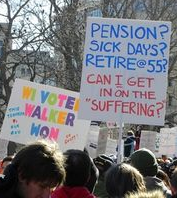
Time to leave teaching. It’s been thirty-six years - two in Lowell, Massachusetts teaching juvenile delinquents and thirty-four in Maine public schools. I’m going to miss it because I love teaching US History and current events to fourteen-year-olds, most days. They can be trying sometimes. When I tell people what age I’ve taught, they often say, “God bless you. I could never do that.”
What I’d come to like about fourteen-year-olds is that they’re capable of learning virtually anything and most of what I teach they’re hearing about for the first time. They don’t have many biases or preconceived ideas about the wider world and they’re very bright. Each year I’ve realized that many are brighter than I am. But I’ve been around longer. I’ve had more time and opportunities to learn, often the hard way. When I teach them classic concepts, they ask extremely perceptive questions I never hear in discussions with jaded adults. Their questions have forced me to consider fresh perspectives on ancient enigmas and those have been my biggest rewards in this work. When I didn’t enjoy teaching, it was often because of some fault of my own - usually my attitude.

Never did expect to be at it so long, but that’s how it unfolded. There were times I wanted to do something else but circumstances prevented career change. Twenty-five years ago, I was diagnosed with a medical condition for which I needed several expensive surgeries, each requiring about six weeks of recovery. With a young family, a mortgage and a pre-existing condition, no other insurance company would take me on. So, for a while, I felt stuck in the job. That wasn’t good for me or for my students until I managed to I change my attitude by counting my blessings - of which there have been many.
For the past few years I’ve met with a retired history teacher to chat about the trade. I asked him how he knew when to give it up. “When the time comes, you just know,” he said, but it didn’t feel right the last time we had lunch. My five-year teaching license was due to expire in July and I went through the process to renew it.

Soon after doing that, however, I went to CPAC - the Conservative Political Action Conference in Washington, for the fifth time. I renewed contacts and new opportunities opened up. I decided to call the Maine Public Employees Retirement Service and inquire about what my pension would look like if this were my last year.
The numbers didn’t point to a cushy life with medical insurance looming as the biggest expense. The economy doesn’t look promising for the foreseeable future either, but I could be dead by the time that changes. My wife and I are physically in good shape right now and we have no debts. She’s gotten her counseling practice down to a manageable pace, and I’ve been the one who is too busy. I’ve maintained a small property-management business for the past twenty-six years and written a regular weekly column for twenty, and I intend to continue with both. My income will diminish. I won’t be able to travel as often, but I’ll have time to pursue other interests which I expect to enjoy more than teaching.
There’s at least one book in me about what it’s been like as a controversial columnist in the same community where I’ve taught. Early in my career I was a liberal and I annoyed conservatives. Then I morphed into a conservative and annoyed liberals, who have been by far the most intolerant of opposing views. Public education is a very liberal profession which doesn’t abide conservatives well, so it’s been lonely. I started writing the book a few years ago but my life has been just too busy to make any progress. I’ve saved most of the paperwork generated by adversaries - most of it in the form of letters to various principals, superintendents, the school board, the state licensing board, and so forth. There are angry letters to the editor from various newspapers in which my column has appeared, and they number well into the hundreds. I don’t know if I’ll be able to sell the book to a publisher once it’s written, but hey: Nothing ventured, nothing gained.
 There’s been no shortage of people who have publicly declared me unfit to teach and who have tried to have me dismissed over the years, but I’ve weathered it. I’m leaving now because I want to. I expect I’ll have a few pangs when I see school busses roll by in September and I’m not part of it anymore, but I’ll get over it.
There’s been no shortage of people who have publicly declared me unfit to teach and who have tried to have me dismissed over the years, but I’ve weathered it. I’m leaving now because I want to. I expect I’ll have a few pangs when I see school busses roll by in September and I’m not part of it anymore, but I’ll get over it.



















































